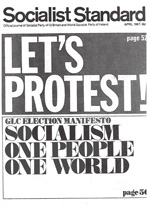50 Years Ago: Vietnam – A Tragedy?
 The word tragedy is firmly linked to the name of Vietnam, so that it is almost impossible to hear one without the other. Everyone seems agreed that the war there is regrettable and unnecessary but nobody seems able to stop it.
The word tragedy is firmly linked to the name of Vietnam, so that it is almost impossible to hear one without the other. Everyone seems agreed that the war there is regrettable and unnecessary but nobody seems able to stop it.
Harold Wilson mournfully tells us that the only thing needed for the success of his recent joint peace move with Kosygin was a gesture of trust from one side or the other. U Thant, when he was talking last year about resigning the Secretaryship of UNO, bemoaned “…the tragic error of relying on force and military means in a deceptive pursuit of peace,” and the United States Ambassador to UNO, Arthur Goldberg, readily agreed—”We …do not believe that force and military means are good arbiters of international dispute.” Which was all very well, were it not for the fact that the USA was busily using just those means at the time. (…)
Vietnam is not a tragedy. Nor is it a mistake. Those who say that it is, whether they protest or not, are trying to excuse the inexcusable. They are trying to prove that capitalism’s wars need not happen—that they are the result of wrong judgements or moral lapses. The whole point of this pretence is that, if we accept it, we also accept that wars can be prevented simply by finding cleverer, or more morally sensitive, leaders. There is then no need to get rid of capitalism.
The melancholy history of capitalism, of its World Wars and of its smaller conflicts like Korea, Algeria and Vietnam, provides the evidence which exposes this pretence. There is small hope for the world, while society regards its problems as tragedies. Capitalism is full of international conflicts. When has it made a comedy of them?
(From article by Ivan, Socialist Standard, April 1967)
